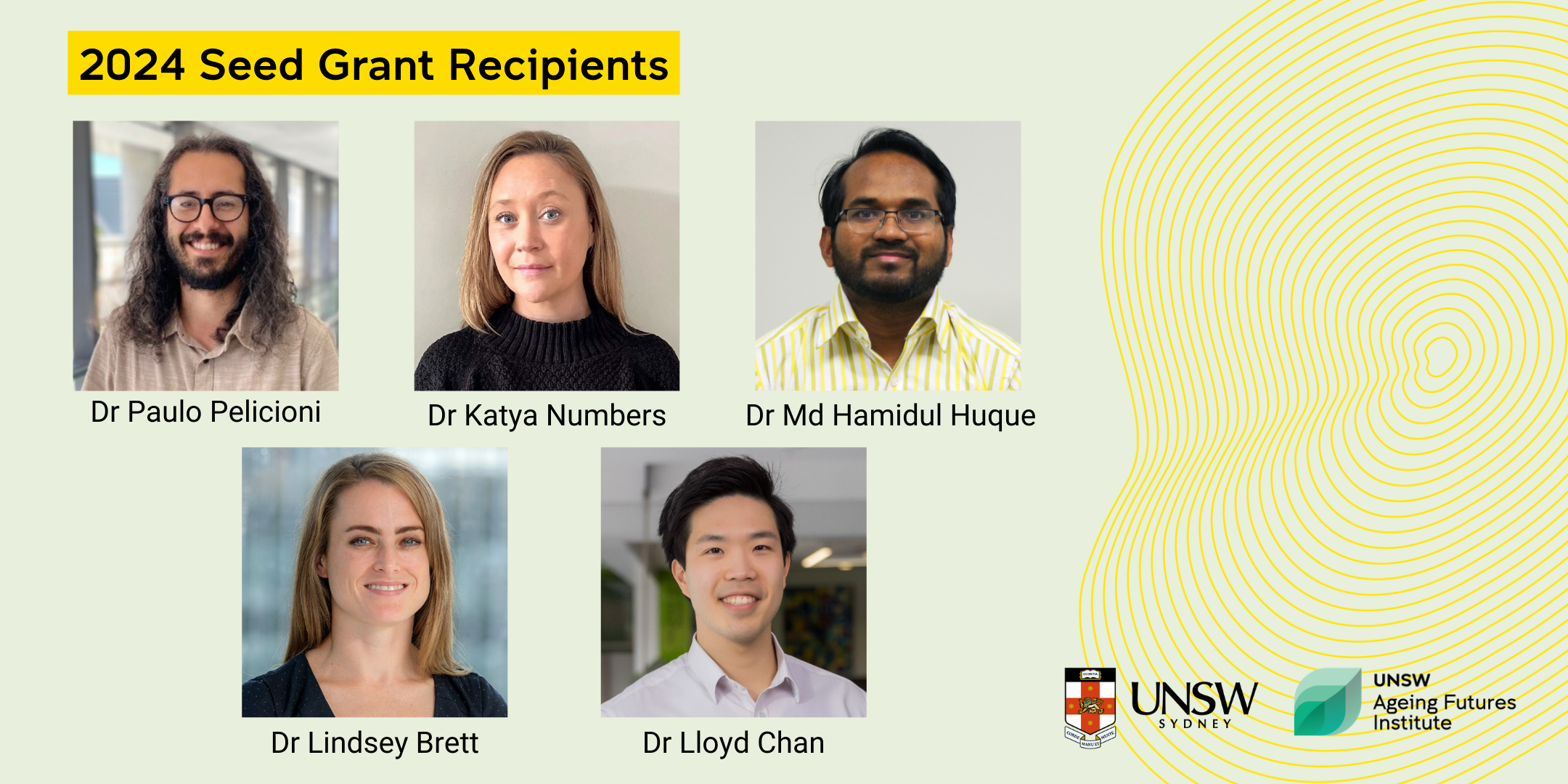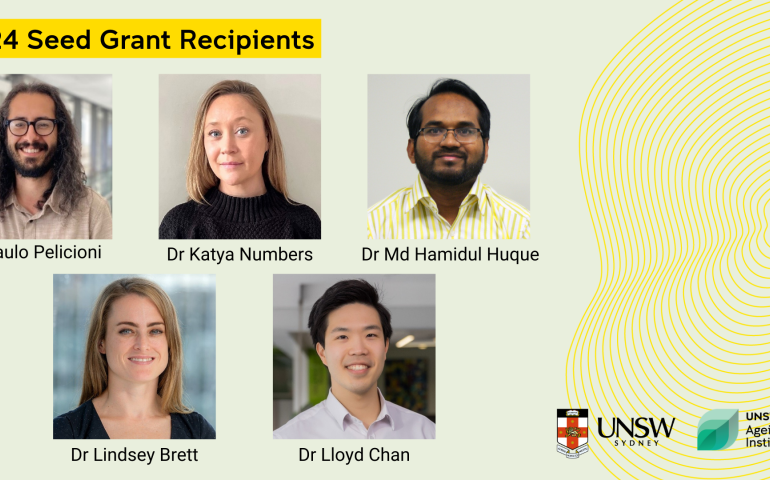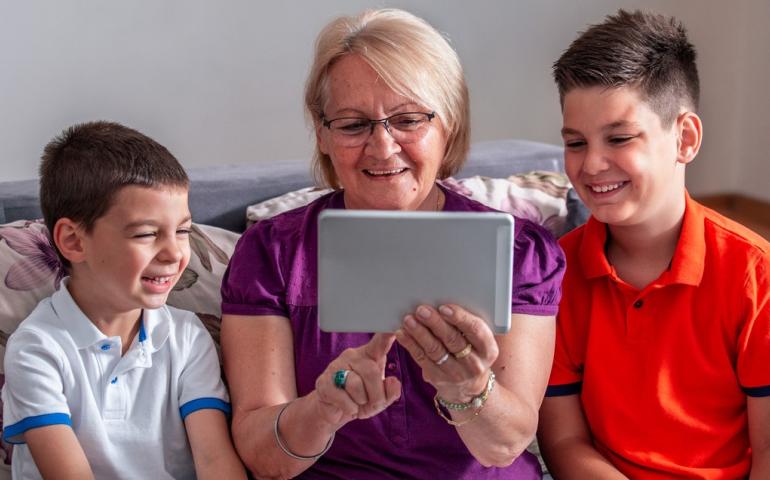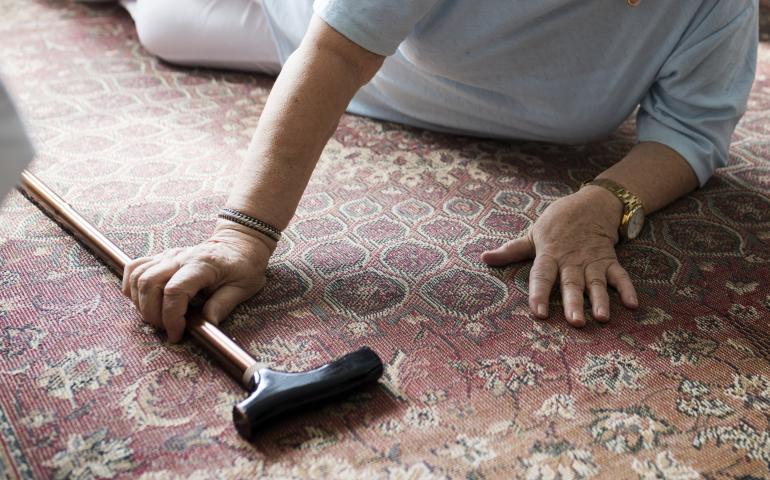Seed Grant Successes: how five funded research projects will address the challenges and opportunities of an ageing society
The UNSW Ageing Futures Institute has funded 5 interdisciplinary projects that aim to address the complex issues of an ageing population.
The projects range from ageism in health, falls prevention in the home, assessing dementia risk and virtual rehabilitation and mobility for ageing in place. The Institute’s seed grant program, that has been running since 2019, supports the development of outstanding quality projects with demonstrated pathways to impact and longer-term research collaborations and impact across all facets of society.
The awarded projects and lead investigators include:
TCC-REHAB: The development of a telerehabilitation app to assess the mobility of older people and people with Parkinson’s disease
This seed funding project will develop a smartphone app-based telerehabilitation system, also called TCC-REHAB. Using TCC-REHAB, the project team will create remote but reliable and valid assessments to examine mobility issues, among other measures of balance and gait of older people and people with Parkinson’s disease. This information will provide healthcare providers with robust tools for remote clinical assessments, reaching consumers in remote and rural areas where access to healthcare is scarce and challenging, reducing disparities in the care of older people and people with Parkinson’s disease.
Lead Investigator: Dr Paulo Pelicioni conducts interdisciplinary research at the intersection of neurorehabilitation, human movement sciences and neuroscience, focused on preventing falls in people with neurological disorders. His fields of expertise and current areas of interest include developing and optimising clinical tools for neurological assessments and neurorehabilitation, understanding the mechanisms of falls in older people and people with Parkinson’s disease, equity in Parkinson’s care, and understanding the function of healthy and pathological brains.
Lost in Translation: Does ageist and gendered language drive low male participation in health promotion research?
Recent studies highlight significant challenges in engaging older men in Intergenerational Programmes (IGPs) due to societal stereotypes and perceived barriers around caregiving roles traditionally associated with women. Despite evidence that IPGs promote social, mental, and physical well-being among older adults and children alike, male participation remains low, underscoring the need for tailored engagement strategies. The project seeks to identify and test effective methods to increase male involvement, including what language is used to describe and promote IPGs, with the aim to expand the reach and efficacy of these programs.
Lead Investigator: Dr Katya Numbers’ research explores how certain lifestyle choices are associated with dementia risk and how to detect early signs of dementia through behaviour. Specifically, Dr Numbers studies how older adults' self-reported cognitive and physical difficulties relate to their risk of developing dementia, how views on ageing impact mental and physical well-being in later life, and strategies for combating harmful stereotypes about ageing and age-related conditions like dementia.
Development and pilot of a rapid-response, virtual, fall-risk assessment and management service for community-dwelling older aged care clients
This project proposes a novel approach to falls prevention by developing a virtual, AHP-led, rapid-response fall-risk assessment and management service for community aged care clients, underpinned by the development of screening algorithms by which community aged care workers can readily identify those clients at highest risk of falling. This project is a critical stepping stone towards larger-scale initiatives, including a validation study of the risk stratification and identification algorithm and the virtually-delivered AHP rapid-response fall-risk assessment and management service. A broader study could involve additional aged care providers to support validation across more diverse populations and locations, and to compare the virtually delivered service model against the current ‘gold standard’ of face-to-face AHP assessment.
Lead Investigator: Dr Lindsey Brett is a physiotherapist by background and has worked in a variety of aged care focused clinical and academic settings in Australia and the UK over the last 16 years. She completed her PhD in 2017 and her research and focuses on aged care and physiotherapy-related topics, such as community aged care services, falls, and dementia.
Meeting the need for valid mid-life dementia risk assessment: Development and validation of risk scores for a midlife specific dementia risk tool
The proposed project will provide a much needed dementia risk tool for middle aged adults with well validated and rigorous scientific measures, research methodology and implementation research. The current project will meet the consumer demand for having a risk score for the middle-aged population that is specific to risk profiles and modifiable factors at this age. Moreover, the current project will bring together highly regarded clinical scientists, developers of the existing CogDrisk tool, and consumer feedback from users to improve online and clinician’s assessments using the tool. This will improve online dementia risk assessment and contribute to dementia risk reduction by providing tailored guidance for users to improve lifestyle habits. The outcome of the project will benefit middle aged adults who are not only at risk of dementia but also cardiometabolic disease (e.g., stroke, coronary heart disease, diabetes etc) by identifying risk factors that are common between dementia and these non-communicable diseases.
Lead Investigator: Dr Md Hamidul Huque is a Research Fellow (statistician) at the School of Psychology, University of New South Wales. His research focused in dementia epidemiology, risk factors for dementia, risk tools development and methodological issues in large administrative datasets.
Beyond Step Counts: Using Wrist-Mount Motion Sensors to Accurately Evaluate Mobility
Information on movement quality, mobility level, and walking aid compliance can inform clinical decisions and facilitate rehabilitation. Our project aims to develop and validate a real-world mobility measurement method for walking aid users using wrist-worn motion sensors. The research output may apply to a wide range of commercial smartwatches and bands, optimizing recovery in geriatric and orthopedic patients.
Lead Investigator: Dr. Lloyd Chan is an APA-titled research physiotherapist and a postdoctoral fellow at NeuRA. His research focuses on quantifying daily-life walking patterns and predicting age-related conditions using wearable devices.
Read more about the UNSW Ageing Futures Institute’s seed grant program here






